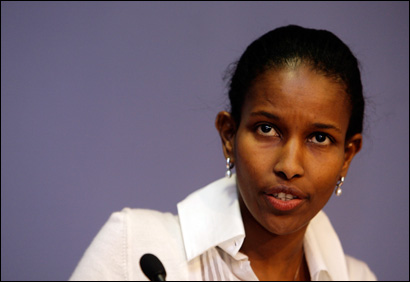February 11, 2006
The Right to Offend

The following is Ayaan Hirsi Ali's speech (the second half) in Berlin yesterday:
Today I am here to defend the right to offend within the bounds of the law. You may wonder: why Berlin? And why me?
Berlin is rich in the history of ideological challenges to the open society. This is the city where a wall kept people within the boundaries of the Communist state. It was the city which focalized the battle for the hearts and minds of citizens. Defenders of the open society educated people in the shortcomings of Communism. The work of Marx was discussed in universities, in op-ed pages and in schools. Dissidents who escaped from the East could write, make films, cartoons and use their creativity to persuade those in the West that Communism was far from paradise on earth.Despite the self-censorship of many in the West, who idealised and defended Communism, and the brutal censorship of the East, that battle was won.
Today, the open society is challenged by Islamism, ascribed to a man named Muhammad Abdullah who lived in the seventh century, and who is regarded as a prophet. Many Muslims are peaceful people; not all are fanatics. As far as I am concerned they have every right to be faithful to their convictions. But within Islam exists a hard-line Islamist movement that rejects democratic freedoms and wants to destroy them. These Islamists seek to convince other Muslims that their way of life is the best. But when opponents of Islamism try to expose the fallacies in the teachings of Muhammad then they are accused of being offensive, blasphemous, socially irresponsible ? even Islamophobic or racist.
The issue is not about race, colour or heritage. It is a conflict of ideas, which transcend borders and races.
Why me? I am a dissident, like those from the Eastern side of this city who defected to the West. I too defected to the West. I was born in Somalia, and grew up in Saudi Arabic and Kenya. I used to be faithful to the guidelines laid down by the prophet Muhammad. Like the thousands demonstrating against the Danish drawings, I used to hold the view that Muhammad was perfect -- the only source of, and indeed, the criterion between good and bad. In 1989 when Khomeini called for Salman Rushdie to be killed for insulting Muhammad, I thought he was right. Now I don?t.
I think that the prophet was wrong to have placed himself and his ideas above critical thought.
I think that the prophet Muhammad was wrong to have subordinated women to men.
I think that the prophet Muhammad was wrong to have decreed that gays be murdered.
I think that the prophet Muhammad was wrong to have said that apostates must be killed.
He was wrong in saying that adulterers should be flogged and stoned, and the hands of thieves should be cut off.
He was wrong in saying that those who die in the cause of Allah will be rewarded with paradise.
He was wrong in claiming that a proper society could be built only on his ideas.
The prophet did and said good things. He encouraged charity to others. But I wish to defend the position that he was also disrespectful and insensitive to those who disagreed with him.
I think it is right to make critical drawings and films of Muhammad. It is necessary to write books on him in order to educate ordinary citizens on Muhammad.
I do not seek to offend religious sentiment, but I will not submit to tyranny. Demanding that people who do not accept Muhammad?s teachings should refrain from drawing him is not a request for respect but a demand for submission.
I am not the only dissident in Islam. There are more like me here in the West. If they have no bodyguards they work under false identities to protect themselves from harm. But there are also others who refuse to conform: in Teheran, in Doha and Riyadh, in Amman and Cairo, in Khartoum and in Mogadishu, in Lahore and in Kabul.
The dissidents of Islamism, like the dissidents of communism, don?t have nuclear bombs or any other weapons. We have no money from oil like the Saudis. We will not burn embassies and flags. We refuse to get carried away in a frenzy of collective violence. In number we are too small and too scattered to become a collective of anything. In electoral terms here in the west we are practically useless.
All we have are our thoughts; and all we ask is a fair chance to express them. Our opponents will use force to silence us. They will use manipulation; they will claim they are mortally offended. They will claim we are mentally unstable and should not be taken seriously. The defenders of Communism, too, used these methods.
Berlin is a city of optimism. Communism failed. The wall was broken down. Things may seem difficult and confusing today. But I am optimistic that the virtual wall, between lovers of liberty and those who succumb to the seduction and safety of totalitarian ideas will also, one day, come down.
Berlin, 9.02.06
Ayaan Hirsi Ali
Posted by Dennis at February 11, 2006 2:47 PM
(via Instapundit)
Leave a comment